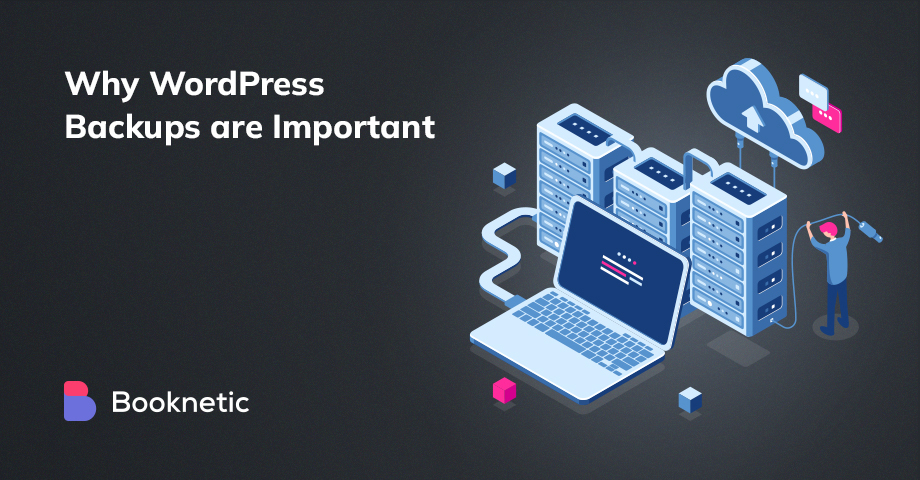
Downtime and data loss. These are two aspects that every online business needs to be protected against. A single mistake can bring down your entire website and drive visitors away, and lead to the loss of valuable business data.
One of the most effective means of securing your WordPress website is to have a reliable website backup. This ensures that even if hackers manage to break into and crash your website, you can restore it in a few minutes. The good news is that for WordPress sites, there are plenty of WordPress plugins that can be used to restore the site – but more on that later!
First, let us look at seven reasons why WordPress backups are important.
Why WordPress backups are important
1. Your website could be broken.
While it is never easy to retain users on a website, a broken website is a sure-shot way to drive and keep them away. Too often, website owners do not update their WordPress version and prefer to run their websites on old or outdated versions. On one hand, this could be a reason for your website to break. On the other, applying a major WordPress update or installing a new plugin or theme can cause incompatibility issues and break your site too.
This is one instance when a website backup can be a lifesaver. All you need to do is revert to the older backup version and get your site up and running!
2. The website is hacked
Powering over a third of all websites, the WordPress platform is the clear favorite for hackers. Hackers have multiple ways to compromise a website including malware, ransomware, and brute force attacks. A hacked website can even impact your SEO efforts as search engines favor safe and functional websites in their rankings.
3. Web server issues
WordPress sites can also go down when the hosting web server crashes. After all, web servers are also hardware components that can run into problems. Although there is a tendency among WordPress websites for higher up times, no hosting company can guarantee 0 server crashes.
Web servers can go down for a variety of reasons such as power outages, human error, hackers infiltrating the host's network, or even disk failure.
4. Human errors
Despite the latest automation, most WordPress sites are managed by humans. This means a minor error in coding or maintenance work can cause it to crash. Most human errors occur during site maintenance. Some of the common human errors include software bugs, incorrect configuration, coding errors, or lack of adherence to security practices.
A complete backup of the website data before maintenance work can help in quick recovery.
5. Natural disasters
Despite the best safety practices, WordPress-powered websites and data centers still face the threat of natural disasters such as flooding, fires, and cyclones. Natural disasters in an immediate vicinity can result in a major data breach or server outage.
The recent COVID-19 pandemic forced some data centers to change their operational procedures to maintain uptime and the demands of social distancing within the premises.
Independent and offsite backups are important to ensure that your website is restored without the risk of extended downtime.
6. To prevent the loss of data
WordPress backups are important to prevent the loss of valuable data, without which no business – small or big – can function. Loss of business and customer data can lead to operational issues, thus impacting revenues and brand loyalty. Regular backups mean that you always have access to the latest website data. This is particularly true for businesses that conduct online payments and financial transactions.
Real-time backups (backups that are activated whenever there is any data change) are especially important if you run an eCommerce store with rapidly changing website and transaction data.
7. To make migration easier
There are many instances of website crashes during a migration process. With backups, it is much easier and safer to migrate your WordPress site to a new host or server. All that you need to do is run a backup before the website migration, and use it at the new domain or host server.
Hope that the above reasons are enough to help you understand the importance of backing up your WordPress site. Next, let us look at the best and easiest way to perform a backup.
What is the best way to backup the WordPress site?
There are multiple ways to take a backup of your WordPress site, including:
Using a WordPress backup plugin
A WordPress backup plugin offers the easiest and most efficient way to backup your WordPress site. There are multiple backup plugins available in the market to choose from, such as BlogVault, BackupBuddy, and UpdraftPlus. Easy to install and use, these backup plugins offer scheduled and automated backups that even users with basic WordPress knowledge can benefit from.
Performing manual backups
If you do not want to rely on a backup plugin, you can perform manual backups of your website data and database tables. This method requires advanced technical knowledge of WordPress or the support of a WordPress agency/developer.
Availing backup services from your WordPress hosting company
The third alternative is to get your backups done by your hosting company. This is convenient as you don't need to spend your time on backup-related activities. However, the quality of backups depends on how often, and well, your hosting company performs backups. Additionally, these services can also overload your website server, thus impacting its performance.
Among the three methods, we would recommend using the backup plugin method. This may cost a few dollars – but takes care of all backups in just a few minutes.
It’s not sufficient to just install and use a backup plugin. You must also follow a few best practices to make the most of it. Let’s discuss these practices next.
Best practices of WordPress backups
No matter which backup method you choose, it is important to follow these best backup practices for your WordPress site:
1. Make sure your backups are complete
An incomplete backup is as good as no backup at all! When restoring your site, you want to do it with a complete backup file – that includes all website installation files, backend files, images, database records, plugins, and themes. Make sure that your backup tool provides backups of all website and database files.
2. Secure backups with encryption
Backup files can also be stolen and compromised by hackers, hence you need to secure them. Among the best practices, secure your stored backup files with data encryption and strong passwords with a random combination of upper and lower-case alphabets, numbers, and special symbols.
Other security best practices include storing your backups on an independent server location and using multi-factor authentication to ensure that only authorized users are trying to access the stored backups.
Backup tools like BlogVault use high-grade file encryption methods for their stored backup files – and also store them in independent cloud locations.
3. Have multiple backup copies
It is also a good practice to store multiple copies of the same backup file at different geographical locations. As mentioned before, natural disasters can hit any place or country – so make sure that your backup copies are stored at a different location.
Backup files can be stored on physical in-premise servers or in the cloud. We recommend you to follow the "3-2-1" rule meaning 3 backup copies at 2 different locations and with 1 copy on the cloud.
4. Schedule website backups
Depending on the frequency of changes to your website data, you must also schedule regular backups of the entire WordPress site and database tables. The higher the rate of data changes, the more frequent must be your backup schedule. For instance, you can perform on-demand backups hourly, daily, weekly, monthly, or yearly.
If you are running an eCommerce store, we recommend real-time backups so you don’t risk losing transactional data. Real-time backups are executed automatically whenever there is any real-time update to the website data.
Backup tools like BlogVault offer all types of backup operations including scheduled and automatic backups, on-demand backups, and real-time backups. It also supports incremental backups, which are performed on its dedicated server so that no load falls on your internal web server.
5. Ensure backups are carried out independent of your web server
Independent backups must be another best practice for your WordPress backups. This is because regular backups are very resource-intensive and can take a toll on your web server resources – thus impacting its overall performance. Besides that, stored backups can take up a lot of disk space on your web servers.
Backup plugins offer an effective solution to these problems. For instance, the BlogVault tool creates multiple versions of the same backup file and stores them on its dedicated BlogVault servers, in addition to providing support for off-site cloud platforms like Dropbox and Google Cloud. It performs all backups and restores operations on independent servers, instead of your web server.
This ensures that you have access to multiple copies and versions during the restore process – without having to worry about website speed and performance.
6. Test backups before restoring
When you restore a corrupt backup file, you can cause more damage to your WordPress site than the initial reason that caused it to crash. Besides, restoring the backup to a live website has its share of risks. A better approach is to first test the backup file before restoring it to the website.
The way to do this is to test your backup in a staging environment. A staging site is an exact duplicate of the live site, where you can apply all the changes you want – without any impact on the live website.
But setting this up is an additional task. We recommend using the inbuilt WordPress staging feature that backup plugins like BlogVault provide. You can test the backup file on the integrated staging platform, and then use the merge functionality to push these changes to the live website.
Over to you
Asking why you need WordPress backups is like asking why you need to keep your site active. It’s something every website – be it a small business or a B2B WordPress website – needs as part of website maintenance. Backups, done right, can secure your business from website hacks and crashes, human errors, and natural disasters.
We hope this article has been informative in highlighting the importance of WordPress backups and how you can build a better backup strategy for your website.
What has your experience with WordPress and website backups been? Let us know in the comments.
Sign up for our newsletter
Be the first to know about releases and industry news and insights.



